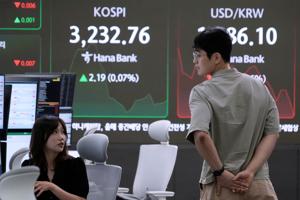World
Wall Street Edges Up as Earnings Reports Fuel Pre-Fed Optimism

Wall Street experienced a modest increase in premarket trading on Wednesday as investors processed a fresh wave of corporate earnings reports while anticipating the Federal Reserve’s decision on interest rates. Futures for the S&P 500 rose by 0.1%, while the Dow Jones Industrial Average remained stable. The Nasdaq saw a slightly stronger performance, climbing by 0.3%.
Analysts broadly expect the Federal Reserve to maintain its benchmark borrowing rate around 4.3%, citing ongoing uncertainty regarding the economic impacts of President Donald Trump‘s extensive tariff increases on imports. Notably, dissent has emerged among Fed governors, particularly from Christopher Waller and Michelle Bowman, signaling differing views on the state of the U.S. economy.
Despite low unemployment figures, hiring has shown signs of stagnation. Economic growth over the first half of the year has been modest, with inflation creeping up in June, largely attributed to the effects of tariffs. Waller has publicly argued that stalled labor market growth necessitates a reevaluation of interest rates, indicating that the Fed should not delay potential cuts in response to further economic decline.
The government’s latest jobs report is set to be released on Friday, with forecasts predicting that U.S. nonfarm employers added 115,000 jobs in July, a decrease from June’s robust figure of 147,000. In contrast, Trump has expressed a keen interest in a rate cut, suggesting it would bolster the economy, a view that contrasts with most economists’ perspectives that a healthy economy does not require lower rates. The Fed’s interest rate policy decision is expected to be announced Wednesday afternoon before market close.
In overnight trading, shares of Starbucks surged over 5% following the company’s optimistic outlook regarding improved store operations and new product launches, including a cold foam protein drink. While Starbucks surpassed Wall Street’s sales expectations for the third quarter, it fell short on profit forecasts, reporting a 2% decline in same-store sales.
Global markets exhibited mixed results following the conclusion of the latest U.S.-China trade talks, which did not yield a formal agreement. China’s chief trade official indicated that both nations agreed to explore extending a deadline of August 12 for imposing higher tariffs. The U.S. side confirmed that the possibility of an extension was discussed, but no definitive decision was made. Treasury Secretary Scott Bessent stated that President Trump would ultimately determine the course of action. Without an extension, tariffs could revert to higher levels.
The Politburo in China convened on Wednesday, pledging support for companies affected by trade disruptions, yet refrained from announcing significant government spending initiatives. According to Julian Evans-Pritchard of Capital Economics, while there is potential for future support, the urgency for immediate stimulus appears to have diminished as trade tensions have eased.
Asian markets reflected this uncertainty; Hong Kong’s Hang Seng index dropped 1.4% to 25,176.93, while the Shanghai Composite index gained 0.2% to 3,615.72. The Nikkei 225 in Tokyo fell slightly by less than 0.1% to 40,654.70, with gains in electronics offset by losses from major exporters like Toyota Motor Corp. and Honda Motor Co.. Conversely, Australia’s S&P/ASX 200 climbed 0.6% to 8,756.40, and South Korea’s Kospi rose 0.7% to 3,254.47. Taiwan’s Taiex increased by 1.1%, while India’s Sensex added 0.2%.
In Europe, recent data revealed minimal growth in the trading bloc’s economy during the second quarter, attributed to earlier efforts to expedite shipments ahead of new U.S. tariffs reversing course. Germany’s economy contracted, leading to a pessimistic outlook given the 15% tariff imposed on European goods under a newly announced EU-U.S. trade deal. The higher tariffs will impose additional costs on European exports, which could either be passed onto U.S. consumers or absorbed by companies, affecting profits. The German DAX rose by 0.1%, while Paris’s CAC 40 gained 0.4%. In contrast, Britain’s FTSE 100 fell 0.4% as a deadline looms for many of Trump’s proposed tariffs on other countries.
In the energy sector, U.S. benchmark crude oil prices decreased by 29 cents to $68.92 per barrel, while Brent crude, the international standard, fell 31 cents to $71.37 per barrel. The dollar weakened against the Japanese yen, dropping to 148.30 from 148.48, and the euro declined to $1.1531 from $1.1546.
-

 Lifestyle3 months ago
Lifestyle3 months agoLibraries Challenge Rising E-Book Costs Amid Growing Demand
-

 Sports3 months ago
Sports3 months agoTyreek Hill Responds to Tua Tagovailoa’s Comments on Team Dynamics
-

 Sports3 months ago
Sports3 months agoLiverpool Secures Agreement to Sign Young Striker Will Wright
-

 Lifestyle3 months ago
Lifestyle3 months agoSave Your Split Tomatoes: Expert Tips for Gardeners
-

 Lifestyle3 months ago
Lifestyle3 months agoPrincess Beatrice’s Daughter Athena Joins Siblings at London Parade
-

 World3 months ago
World3 months agoWinter Storms Lash New South Wales with Snow, Flood Risks
-

 Science3 months ago
Science3 months agoTrump Administration Moves to Repeal Key Climate Regulation
-

 Science2 months ago
Science2 months agoSan Francisco Hosts Unique Contest to Identify “Performative Males”
-

 Business3 months ago
Business3 months agoSoFi Technologies Shares Slip 2% Following Insider Stock Sale
-

 Science3 months ago
Science3 months agoNew Tool Reveals Link Between Horse Coat Condition and Parasites
-

 Sports3 months ago
Sports3 months agoElon Musk Sculpture Travels From Utah to Yosemite National Park
-

 Science3 months ago
Science3 months agoNew Study Confirms Humans Transported Stonehenge Bluestones









